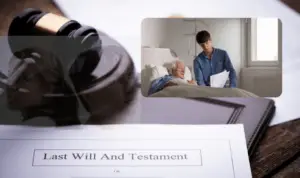Technology is pervading all areas of society, including the legal system, with the adoption of Republic Act [RA] No. 8792, otherwise known as The Electronic Commerce Act of 2000,1 and The Rules on Electronic Evidence 2. Nevertheless, despite numerous enactments of laws to come abreast with the digital age, the Philippines still seems to fall behind in innovating its laws on testamentary succession to accommodate modernity. This article therefore proposes the legal accommodation of a type of will that may become prevalent in the 21st century – a video last will and testament.
A will is an act whereby a person is permitted, with the formalities prescribed by law, to control to a certain degree the disposition of his estate, to take effect after his death.3 This means that a will is a legal document of a person’s declaration to dispose his property after his death.
The Civil Code of the Philippines recognizes only two kinds of wills: a notarial will and a holographic will. A notarial will refers to one that is executed in writing, signed and sworn to by the testator, attested by three witnesses, and acknowledged before a notary public.4 A holographic will, on the other hand, is a will entirely written, dated, and signed by the testator.5
What may be a video last will and testament?
In contrast to a notarial and a holographic will, which are both written instruments, a video will refers to a real time declaration recorded through a video-capturing device, in which a person declares to control the disposition of his estate after his death.
In the Philippines, a video last will and testament would be relevant for a great number of computer-proficient Filipinos. The Ericsson Mobility Report projects that smartphone users in the Philippines are expected to reach up to 90 million by 2021.6
Moreover, in 2018, the Digital 2019 report by Hootsuite reveals that the Philippines is the world’s heaviest internet users where an individual spent about an average of 10 hours and two minutes a day online.
The Time Magazine also reports that up to 36 million Filipinos use TikTok, a social media application that allows users to create, share, and watch a video on mobile devices. These studies prove the exponential increase of Filipinos that are using in their daily lives devices capable of recording and storing videos.
This would mean that many Filipinos could easily and more conveniently create a video or a video will for that matter, with a smartphone or any video-recording device within their reach. If allowed by law, this will be an innovation to the present strict approach in executing valid last will and testament.
Why use a video last will and testament?
A video will is easy to create with the click of the start video on an electronic gadget. It is easy to operate since most Filipinos know how to control a smartphone or a laptop. Additionally, a video will is accessible since many Filipinos own an electronic gadget to make such kind of will. Furthermore, a video will is easy to store in an electronic storage device and is easy to share with other people with just a few clicks.
The advantage of the video will arises when the testator is alone, on the verge of death, and cannot use his hand to write a will. Since most Filipino users are heavy smartphone users, it is most probable that they carry their smartphone with them most of the time rather than a pen and paper.
Considering that a will must be in writing (Art. 804, Civil Code), it would be difficult or impossible for the testator to make use of his hand or even type when he is on his death bed or when he is suffering from a chronic illness. Even if he could type in his phone, he may not be able to manually sign a typewritten will.
As such, since making a video is easy with a few clicks, the testator can make a video recording of his last will and testament more conveniently and faster than writing a notarial or a holographic will.
Circumstances that video will may be applicable
The following are the applicable circumstances in which a video will could be resorted to:
- On the verge of death;
- Instances where the testator is unable to make a notarial or a holographic will; and
- Special circumstances to be determined by the court.
The issues to be discussed below will show why the video will should only be used in such exceptional circumstances.
Issues with a Video Will
While a video will would be a convenient choice for the testator in making his will, a video will faces obstacles in the current legal system. Some of these issues are enumerated as follows:
- A video does not comply with the formalities required by law for the validity of a will (Arts. 804 to 809);
- There is a possibility of absence of witnesses during the recording of the video will;
- The video recording contains no signature; and
- The video recording is prone to.
Issue on formalities
The formal requirements for wills, in general, are as follows:
- In writing; and
- Executed in a language or dialect known to the testator (Art. 804, ibid).
In Gil vs. Murciano,7 the Supreme Court stated that the compliance with the formalities required by law is essential to the validity of a will. The purpose of these formalities is to prevent bad faith and fraud and to guarantee the authenticity of a will.
Obviously, a video will does not comply with the first requisite for wills as a video merely records, displays or broadcasts moving visual media. Therefore, a video will is presently invalid for Filipinos to make.
Although a Filipino may not have any other choice but to use a video to record his will, there is no jurisprudence or law that exempts Filipinos from complying with the formal requirements for wills. Yet, if there is indeed a valid last will and testament, whether notarial or holographic, such video recording may be admitted in evidence to prove the execution thereof, which may be relevant in the probate of a will.
Hence, accommodating a video will in the Philippine legal system would not mean that the formalities for notarial and holographic will could also be applied.
Nevertheless, the lack of the traditional formalities in a video will would not so easily make it prone to bad faith, forgery, or fraud, or undue and improper pressure and influence.
The video recording itself, aforesaid, would easily prove the authenticity of the will as it would show the image of the testator himself during the making of the will, including his state of mind, emotions, behavior, and other bodily conditions.
The video will would, thus, allow the visual examination of the testator as to whether he is making the will in his own volition – an advantage that cannot arise in either a notarial or a holographic will.
Absence of witnesses during the recording of the will
Another problem with a video will is that it would be challenging to prove that the testator was of sound mind during the creation of the video will should there be no witnesses during the recording thereof.
This is a relatively easier issue in a notarial will, which requires witnesses as a formal requisite (Art. 805, Civil Code) and a holographic will, which can have a witness to the testator’s handwriting.
In the probate of a holographic will, it shall be necessary that at least one witness who knows the handwriting and signature of the testator explicitly declare that the will and the signature are in the handwriting of the testator. If the will is contested, at least three of such witnesses shall be required.8
Nonetheless, as discussed above, the video recording could still be a sufficient evidence of the authenticity of the will even in the absence of a witness during the making thereof, as it could visually show whether the testator is freely and lucidly dictating his dispositions.
Even without a witness during the video recording of the will, witnesses familiar to the testator could still testify as to the soundness of the latter’s mind in the period within which he made his will, and as to the improbability of bad faith, fraud, and other circumstances which could invalidate a will.
Lack of signature
In addition to the two general requirements of a will, Article 805 provides that “[e]very will, other than a holographic will, must be subscribed at the end thereof by the testator himself or by the testator’s name written by some other person in his presence, and by his express direction, and attested and subscribed by three or more credible witnesses in the presence of the testator and of one another.”9
With a video will, it is impossible for the testator to sign his video will by any other means. Also, since a video will must be used only in exceptional circumstances, the witness rule under Art. 805 may not be followed, especially if the testator changes his mind on the verge of death and dies alone.
Hence, a witness may not be available to sign an attestation in such exceptional circumstances, and even if one is present, it may still prove difficult to create and sign an attestation instrument in said circumstances.
Despite that, a signature would no longer be necessary in a video recording that visually shows the testator himself dictating his will. In a written document, it is legally impossible to prove that a person had written such document himself without his signature.
This problem would no longer arise in a video will, as the video recording would categorically show that the testator himself is narrating his dispositions. However, to guarantee authenticity, it should be the testator himself, and no other person on his behalf, who should dictate his entire dispositions. This formal requisite serves the same purpose in a similar way as a holographic will must be entirely written by the testator.
Prone to editing
In addition, like any other kind of will, a video will is prone to editing. When edited, a video cannot be reverted to its original state and an original video cannot be recreated from an edited version, unless one has access to the original video. In effect, the video is invalid and cannot give rise to a valid will.
Consequently, when it is apparent that the video will is edited or manipulated by other means, the court should lean more towards invalidating the will. Strict adherence to the law is a matter of necessity, in order to prevent fraud.
Recommendation
Even with the solutions presented above, a video will is still arguably less reliable than a notarial will (in terms of authenticity) and a holographic will (in terms of clarity and organization of the dispositions).
Hence, a video will may only be allowed in the following exceptional circumstances:
(1) on the verge of death;
(2) in instances where the testator is unable to make a notarial or a holographic will; and
(3) other special circumstances to be considered by the court.
This kind of will should only be permitted in exceptional circumstances so that the wishes of the testator would be fulfilled even though he could not make a notarial or a holographic will.
The Civil Code presently allows notarial and holographic wills only, which are both written instruments. On the other hand, a video will is an oral act, hence, is presently not a valid will in the Civil Code. Therefore, there is a need to amend the Code to accommodate video wills.
In amending the Code, the existing formal requisites of a notarial and a holographic will should no longer apply for a video will, except for certain strict safeguards. A signature may be dispensed with in a video will since it is impossible for the testator to manually sign the video recording.
The placing of a date in the will should no longer be necessary because most video recordings have a timestamp. Other requisites like witnesses and acknowledgment before a notary public may be dispensed with since these would be difficult to procure in the above-mentioned special circumstances. The only formal requisite then to guarantee authenticity is that the testator himself, and no other person, should dictate his entire disposition.
Conclusion
A video will should be adopted in the current legal system of the Philippines to catch up with the digital age and to make the creation or substitution of a will easier for testators in exceptional circumstances.
For the Philippines to adopt a video will, the Civil Code must be amended to declare a video will valid, with the only formal requirement that the testator alone must dictate his entire disposition.
Additionally, the video should only be resorted to in circumstances when the testator is unable to create a notarial or a holographic will. With such an amendment to the Civil, a testator would still have an opportunity to dispose his property and rights even at a moment when he can no longer write a will.




